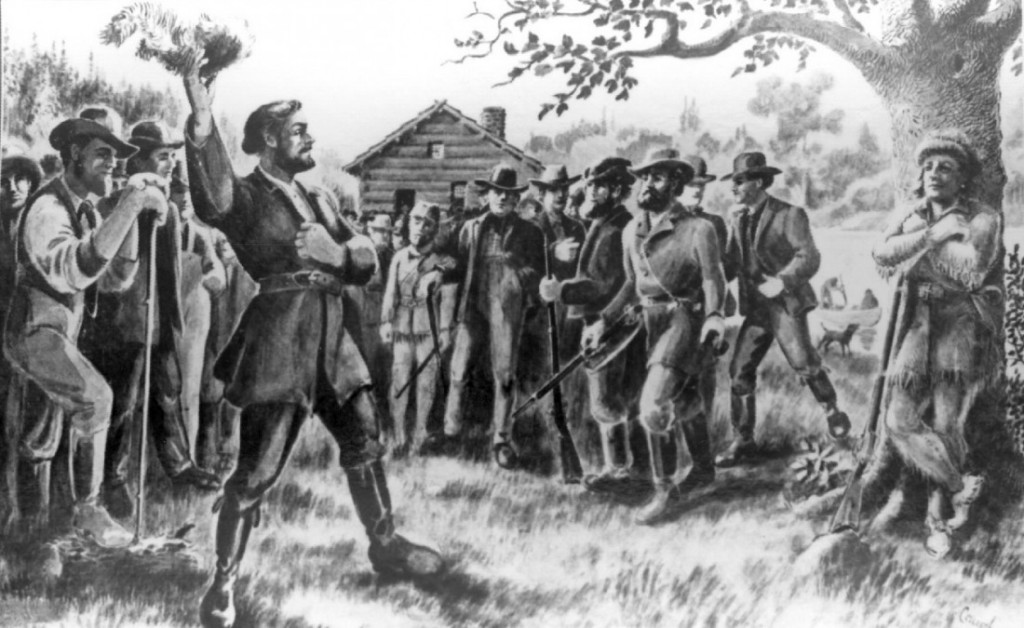Alonzo A. Skinner was the first judge in the Pacific Northwest, although he had no courtroom and no courthouse and the laws he enforced were adopted by a legislature that had no foundation in law.
Skinner was born in Portage County, Ohio, in 1814. He read law there, was admitted to practice in 1840, and served briefly as a part-time prosecutor. In 1845, he joined the overland migration to Oregon, where he settled on a farm and practiced law on the side.
The United States and Great Britain still were arguing over who owned the Oregon Country, and frustrated settlers, most of them U.S. citizens, met in 1841 to establish a provisional government with a one-house legislature. Part of this do-it-yourself government was a judiciary that grew into a scattering of part-time county, probate, and justice courts.
In 1846, the Provisional Legislature established a circuit court with general civil and criminal jurisdiction. Alonzo Skinner was appointed as its first judge; his jurisdiction was what is now Oregon, Washington, Idaho, and western Montana. His salary was $800 a year. Skinner's job was to hold court twice a year in the eight counties in the territory. There were no courtrooms in Judge Skinner's Oregon. The three times he is recorded as sitting in Polk County, for example, he held court once in a homesteader’s cabin and twice in a one-room school.
The laws Skinner enforced were a mix of Common Law, specific organic acts of the Provisional Legislature, and the Iowa Code of 1838-1839, which the Provisional Legislature had adopted to fill in where needed. The territory's only jail, at Oregon City, burned in 1846 and was not replaced.
In August 1848, following the ratification of the Oregon Treaty, Oregon became a territory of the United States. Seven months later, the first territorial judge, Orville C. Pratt, arrived at Oregon City and Skinner left his position. In 1849, Skinner was appointed prosecutor of six Indians who were charged with murdering a settler near Fort Nisqually, and in 1850-1851 he was part of the three-member commission that negotiated treaties with the Willamette Valley tribes. In 1851, he served as Indian agent for the Rogue River tribes in southern Oregon. A Whig, he ran against Joseph Lane in 1852 for territorial delegate to Congress and lost.
Skinner and his wife, Elizabeth Lincoln Skinner, taught school at Astoria; they later moved to Willamina and then Eugene. In Eugene, Skinner practiced law, was city recorder, and Lane County clerk. He also served as the U.S. Army's civilian deputy assistant provost marshal, supervising the registration of men in southern Oregon for the Civil War draft that never came to the state.
When Riley E. Stratton, associate justice of the Oregon Supreme Court, died in 1866, Skinner was appointed to serve until a successor was elected. In 1870, he was appointed U.S. Collector of Customs at Empire City (Coos Bay).
When his health began to fail, Skinner moved to Santa Barbara, California, where he died on April 30, 1877.
-
![]()
Alonzo Skinner, 1845.
Courtesy Oreg. Hist. Soc. Research Library, 002535
Related Entries
-
![Joseph Lane (1801-1881)]()
Joseph Lane (1801-1881)
Joseph Lane was the first governor of Oregon Territory. A leading Democ…
-
![Provisional Government]()
Provisional Government
The Provisional Government, created in May-July 1843, was the first gov…
Map This on the Oregon History WayFinder
The Oregon History Wayfinder is an interactive map that identifies significant places, people, and events in Oregon history.
Further Reading
Corning, Howard McMinley. Dictionary of Oregon History. Portland, Ore.: Binford and Mort, 1956.
McArthur, Scott. "Judging Alonzo." Oregon State Bar Bulletin, Oct. 1999, pp. 37-42.



